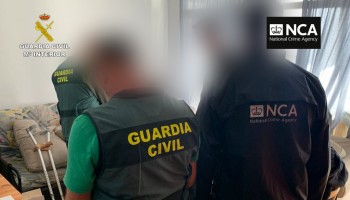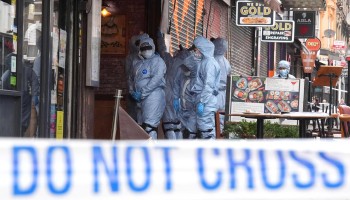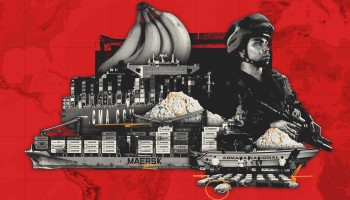Using inflatable boats that cost between £3,000 and £12,500 (US$3,870 and $16,129), the group transported at least 18 people per boat across the Channel charging each £5,500 ($7,096). Without the intervention of the NCA, authorities believe they would have seen migrants smuggled on jet-skis for the first time.
Due to a serious lack of boating experience, the group faced repeated failures.
In one attempt the boat, which had two or three minors between the ages of 16 and 18, ran out of fuel and had to be saved by a border control team and a coastguard helicopter.
“It was very overcrowded, only two people had life jackets,” said Richard Davis, who is an officer on the Border Force. “They were seen to be bailing water out of the vessel...There were people suffering from hypothermia.”
The operation began in 2016 and was organized by two criminal networks, one Albanian and one based in Kent — a county in Southeast England. The Albanian organizers facilitated the movement of migrants while the Kent group, led by a family, supplied the transport vehicles.
Investigators were first alerted when one of the inflatable boats, called Rebel, appeared on the beach of an abandoned border facility in Kent in May 2016. The boat’s electronic system showed that it had travelled from the north of France.
The boat was purchased in cash for £12,500 ($16,129) on May 5 and arrived at a beach in Escalles, France five days later. French National Police then witnessed a group of people being taken from hotels in Calais by a taxi to the beach.
On May 11, CCTV recorded three vehicles arriving in Kent, two of which were being driven by Albanian organizers Artur Nutaj and Saba Dulaj.
On May 26, a group of 17 people were seen wading into the water in Escalles but the boat left after a car in a parking lot above the beach flashed its lights, signaling the boat to leave.
The dangerous journey that ended in migrants bailing water out of the boat and a Coastguard rescue mission began two days later. A white minibus — under NCA surveillance — awaited their arrival in Kent. The criminal network apparently attempted their own rescue but abandoned the boat when they saw law enforcement intervene.
The two men steering the boat were investigated, convicted and jailed.
Undeterred, the gang bought another boat, which they called A Boat With No Name, and tried again in July.
This time NCA officers planted a listening device on the new boat and recorded evidence of preparation for another run. They also installed at camera and recording device at Ramsgate Harbour in Kent, on which they could hear two men struggling to operate the GPS.
“I didn’t say I could work it. He can work it,” one man was heard saying on the phone. “I told you last time, the last thing I can do is work the sat nav [satellite navigation].”
But the trip, which was postponed one day due to bad weather, failed once again. They narrowly avoided a fishing vessel and a cargo vessel, travelled against traffic in a busy shipping lane, and finally ran out of fuel. The crew made a mayday call and was again rescued by border control.
A few weeks later, three members of the criminal gang were seen purchasing a jet-ski, which authorities believe was meant to be used to transport migrants. The three were arrested before they could find out.
On the same day police raided a farm in Kent owned by the family in charge of the purchasing portion of the smuggling network. Authorities found drugs, cutting agents, which are cheaper chemicals used to dilute the drugs, and stolen vehicles.
While George Powell, the man who owned that farm, pleaded guilty on May 15, 2018, the rest of the members pleaded not guilty.
On Tuesday, six more were found guilty of conspiring to breach immigration law and will be sentenced along with Powell on September 21.






